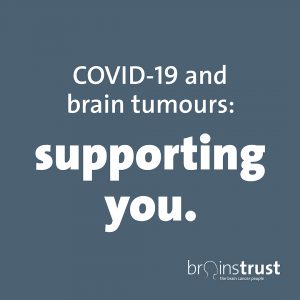 The latest Coronavirus guidance for people with a brain tumour
The latest Coronavirus guidance for people with a brain tumour
On 31st October, the government announced the details of new national restrictions that will take place in England from 5th November until 2nd December. You can view the details of these new restrictions here.
Just like last time, we are still here for you during this lockdown and beyond. Whether you want to join us for a virtual meetup or webinar or arrange some coaching sessions with a support specialist – you don’t need to face this alone.
Give us a call on 01983 292 405 if you don’t know where to start, or drop an email to hello@brainstrust.org.uk
In this article you can read:
- The latest guidance for the clinically extremely vulnerable in England
- The current restrictions and guidance in Scotland, Wales and Northern Ireland
- What has changed in England
- The updated guidance for children and teenagers with a brain tumour
The latest guidance for the clinically extremely vulnerable in England
Alongside the new restrictions, there is also additional guidance for clinically extremely vulnerable people. For people living with a brain tumour diagnosis, this guidance applies to people having chemotherapy or who are on a high dose of steroids. Clinically extremely vulnerable people who are on the Shielded Patient List, will receive a letter with details of the updated guidance. This is what the letter will say (please understand until you receive a personal letter this is for reference only).
Scotland, Wales and Northern Ireland have different national restrictions and advice for clinically extremely vulnerable people.
Scotland: There is currently a system of local protection levels in place across Scotland. You can view details of these levels here.
Wales: Wales is currently under Firebreak restrictions until 9th November, when new restrictions will be announced. These current restrictions apply to everybody who lives in Wales. You can view details of guidance for clinically extremely vulnerable people in Wales here.
Northern Ireland: The current restrictions for Northern Ireland have been in place since 16th October and will run for 4 weeks. There are no additional restrictions for clinically extremely vulnerable people. You can view details of the current guidance here.
So what has changed for people who are clinically extremely vulnerable?
From 5 November, new national restrictions will be put in place in England. The additional guidance for clinically extremely vulnerable people is:
- Stay at home as much as possible, except to go outdoors for exercise or to attend essential health appointments
- Work from home where possible. If you cannot work from home, it is advised that you do not attend work for this period of restrictions. You may be eligible to apply for financial support during this period and may be able to use any official communications advising you to shield as evidence to help you access this support.
- Avoid all non-essential travel by private or public transport. This includes not travelling to work, school, shops or pharmacy. Where possible you should ask others to collect and deliver items on your behalf. This can be done by friends, family members or volunteer groups. You can also register for additional support which includes access to priority supermarket delivery slots. You can find more information about this here.
Full details of the new restrictions can be found here.
It is important that you still continue to seek support from the NHS and other healthcare providers for existing health conditions and any new health concerns you may be experiencing.
Latest COVID-19 guidance for children and teenagers with a brain tumour
At the start of the Coronavirus outbreak many children and young people with a brain tumour were identified as a clinically vulnerable and were placed on the shielding list. At the time the decision was based on limited evidence. With more data analysis and research, the advice about which children are at a higher risk of infection because they are classed as ‘clinically extremely vulnerable’ has been updated. Many children and young people that were on the list for shielding originally may not be now. This is because the risk of COVID-19 for children and young people with cancer remains low (CCLG).
Children and young people with a brain tumour may be placed in two groups:
- Extremely vulnerable group: Children in this group are typically on active treatment for certain tumours and are at risk of contracting other infections apart from Coronavirus. Because of this, children in this group are not recommended to attend school or nursery. They should follow the government guidance of social distancing and hand washing. They do not need to follow strict shielding rules. Siblings of children in this group can continue to go to school as child to child transmission remains low. You may want to keep all your children at home, but it is important you discuss this with your child’s clinical team and respective schools.
- Vulnerable group: These children can continue to attend school and families do not need to follow strict shielding rules. Families should follow government guidance and follow good hygiene to prevent infections. Children and young people in this group can go out for exercise but must remain in their households or support bubbles.
For full details of which grouping your child may fall in to have a read of the guidance published by CCLG. For many children and young people with a brain tumour, clinicians may evaluate this case by case to decide whether the person needs to remain on the shielding list and what guidance you should follow. If your child is on treatment, the team at the hospital will inform you of any changes you need to follow to feel safe during this lockdown. For those that are not currently in treatment, you will need to get in touch with your child’s GP for guidance on what grouping they are in.
If you are a parent or caregiver, and you are unclear as to whether your child falls under the extremely vulnerable group, please reach out to your clinical team or GP.








